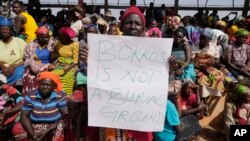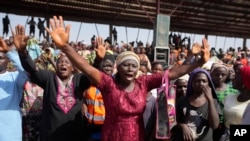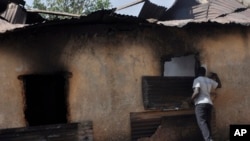Nearly 200 people died in attacks that began in the evening of December 23 and lasted through the morning of December 26 in Nigeria's Plateau State, wracked by violence for years.
Religious and ethnic tensions have for years roiled the province, which lies between the Muslim-majority north and mainly Christian south.
The attacks led to nearly 20,000 people, mostly women and children, leaving some 20 villages around Bokkos and Barkin Ladi.
They are now sheltering in 23 camps set up by the Red Cross.
"We were cooking when the gunmen attacked our community. We had to run for our lives. We didn't even know where we were running to," said Lucy Joshua, who lost seven members of her family.
"At the moment, I don't know where some of my children and grandchildren are."
Joshua said the survivors had been supported by the Red Cross, while the church and Bokkos residents had provided food and clothes.
"No one from the government has helped us, but we are told that they are coming," said Josephine Matthew, whose husband, brothers and children perished, adding that there was a severe shortage of food and water.
The church in Bokkos is ill equipped for the influx and access to drinking water, toilets or medical care are severely lacking.
"The attackers killed a lot of people. They burned our houses and farm produce. We are really in a sorry situation, we need everything to survive," Abigail Moses said.
Nuruddeen Hussain Magaji, a local coordinator for the Nigerian Red Cross, said there was a "dire need" for aid.
"They need food, water, clothes, sanitary hygiene products," he said, adding that the survivors also needed psychological support to with the trauma.
The identity of the attackers is not yet known.
Aid imminent
During a visit to the region on Wednesday, Vice President Kashim Shettima said aid would arrive shortly.
"I will personally supervise it, and ensure that none of it is hijacked by any body," said Caleb Mutfwang, the state governor.
Yuhanna Audu from the national rescue agency NEMA told AFP that supplies were coming and distribution should start within two days.
Nigerian President Bola Ahmed Tinubu has ordered "security agencies to immediately move in, scour every stretch of the zone, and apprehend the culprits".
Northwest and central Nigeria have been long terrorized by bandit militias operating from bases deep in forests and raiding villages to loot and kidnap residents for ransom.
Competition for natural resources between nomadic herders and farmers, intensified by rapid population growth and climate pressures, has also exacerbated social tensions and sparked violence.
A jihadist conflict has raged in northeastern Nigeria since 2009, killing tens of thousands of people and displacing around two million, as Boko Haram jihadists battle for supremacy with rivals linked to the Islamic State group.
United Nations rights chief Volker Turk said in a statement he was "deeply alarmed" by the Christmas weekend attacks.
"The cycle of impunity fueling recurrent violence must be urgently broken. The government should also take meaningful steps to address the underlying root causes and to ensure non-recurrence of this devastating violence," he said.









Forum